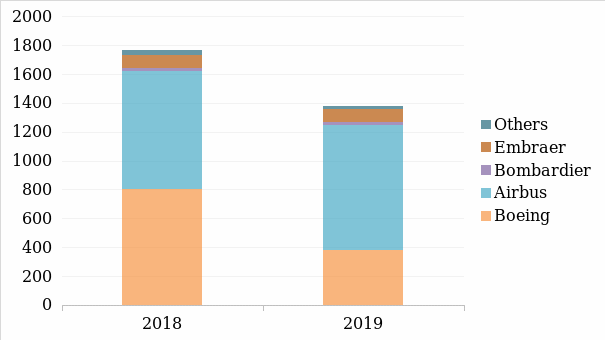The Boeing Company, similar to other large aircraft manufacturers, is experiencing an economic decline due to the combination of recent events. Examining the company’s financial performance from 2015 to 2019, one can see a gradual increase in revenue from 2015 to 2018, followed by a steep decrease between 2018 and 2019 (Table 1). To compare, in 2018, the basic earning per share was $18.05, and in 2019, the firm faced loss in the amount of $1.12 per share (The Boeing Company, 2019). Boeing’s total debt was increasing slowly over the last five years, but it more than doubled over the last year. The latest quarterly report shows an even higher loss per share – $5,31 (The Boeing Company, 2020).
Table 1. Five-Year Summary of Financial Data. (The Boeing Company, 2019, Item 6. Selected Financial Data).
These numbers indicate a challenging position for the company, caused by such events as the COVID-19 pandemic and the Boeing 737 Max’s grounding. In 2019, the Boeing 737 Max was grounded following two aircraft crashes in 2018 and 2019. The cut in the corporation’s deliveries and production has led to a drop in share prices and canceled orders of the model (Nakahara, 2020). Currently, the 737 Max’ grounding is still in effect, and Boeing’s hopes that it could be recertified in the first part of 2020 did not come true. Furthermore, the decreased demand in aircraft travel puts the planes’ demand rates in a position of uncertainty.
Another major event was and continues to be the pandemic of COVID-19, which resulted in suspended travel for many countries. This change in demand implies that the Boeing Company’s services and products are not as needed as usual. At one point, the company asked for a government bailout ($60 billion) to support itself. However, Boeing later raised about $25 billion of bonds and withdrew the request for government assistance (Scigliuzzo & Johnsson, 2020). Although this amount can help the corporation sustain itself over this uncertain time, it is unclear whether Boeing will thrive in the nearest future. In fact, the company is already preparing for potential risks by cutting more than 10% of its staff globally (Scigliuzzo & Johnsson, 2020). Such deep cuts signify that the company’s ideology is shifting towards a long-term decrease in demand for international flights.
On the market, the Boeing Company has been losing share to its main competitor, Airbus. Together, the two rivals hold almost 99% of the market, but the newer company (Airbus) is slowly increasing its outreach (Statista, 2020). In 2018, Airbus delivered 813 units, and Boeing added 806 units; in 2019, Airbus’ delivery increased to 862 units, while Boeing contributed only 380 jets to the global aircraft fleet (Figure 1). At the same time, Airbus is taking over the market segment of civilian helicopters – an area where Boeing is not represented. This change in competitor’s representation in the fleet signifies the great impact of the 737 Max’s grounding, presenting a real threat for the company to further lose its brand power.

The Boeing Company is not stagnating or growing since it continues to lose market share. The need to lay off more than 10% of all staff, as well as the focus on increasing cash assets, show that the brand is preparing for a period of survival. The pandemic and the latest grounding led to a decrease in Boeing’s revenue and increased its debts. Overall, Boeing remains in a challenging position, which is unlikely to improve if it fails to recertify the 737 Max or deal with decreasing demand for aircraft travel.
References
The Boeing Company. (2019). Form 10-K for the fiscal year ended December 31, 2019. Securities and Exchange Commission.
The Boeing Company. (2020). Form 10-Q for the quarter ended June 30, 2020. Securities and Exchange Commission.
Nakahara, M. (2020). The continued grounding of the Boeing 737 MAX. The Regulatory Review.
Scigliuzzo, D. & Johnsson, J. (2020). The non-bailout: How the fed saved Boeing without paying a dime. Bloomberg.
Statista. (2020). Number of jets added to the global aircraft fleet from 1999 to 2019, by manufacturer (in units).